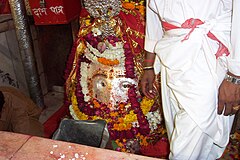Kalka Mandir, Delhi
| Shri Kalkaji Mandir | |
|---|---|
 |
|
| Name | |
| Proper name | Kalkaji Mandir |
| Devanagari | कालकाजी मंदिर, दिल्ली,भारत |
| Geography | |
| Country | India |
| State | Delhi |
| District | South |
| Location | Kalkaji Mandir (Delhi Metro) South Delhi |
| Culture | |
| Primary deity | Kali- काली, Kalka - कालका |
| Important festivals | Navratri नवरात्रि महोत्सव |
| Architecture | |
| Architectural styles | Hindu temple architecture |
| Number of temples | 2 |
| History and governance | |
| Date built | Sat Yuga सतयुग |
| Website | http://www.shrikalkajimandir.com |
Kalkaji Mandir, also known as Kalkaji Temple, is a Hindu mandir or temple, dedicated to the Hindu Goddess Kali. This temple (mandir) is situated in the southern part of Delhi, India, in Kalkaji, a locality that has derived its name from the temple and is located opposite Nehru Place business centre. The temple is accessible by public transport on Kalkaji Mandir (Delhi Metro) and is near Bus Terminus-Nehru Place and Railway Station-Okhla. The general belief is that the image of the Goddess Kalka here is a self-manifested one, and that the shrine dates back to Satya Yuga when the Goddess Kalika had incarnated and killed the demon Raktabija along with other giant demons.
Kalka or Kalkaji Mandir is amongst the oldest and the most revered temples of India. The temple is dedicated to the goddess Kalka or Kali, an incarnation of Durga. It is also called 'Jayanti Peetha' or 'Manokamna Siddha Peetha'. 'Manokamna' literally means desire, 'Siddha' means fulfillment, and 'Peetha' means shrine. So, it is believed to be the holy shrine where one gets the blessings of Maa Kalika Devi (Goddess or Mother Kalika) for the fulfillment of one's desires.
The temple complex is situated on Kalkaji Mandir (Delhi Metro) between the Nehru Place bus terminus & business center and Okhla railway station & industrial area, and is right beside the Bahá'í Lotus Temple. Close by to the temple, on a hill in the East of Kailash neighbourhood and near the ISKCON temple, lies an Edict of Ashoka, dating 3rd century BC.
Devotees attend the Kalkaji temple throughout the year, but the culmination point of their prayers and celebration comes during the festival of Navratri twice a year. This is a nine-day Hindu festival, in Spring and Autumn during which a large fair is organized. Devotees gather and sing various hymns and songs praising the Goddess Durga.
...
Wikipedia

